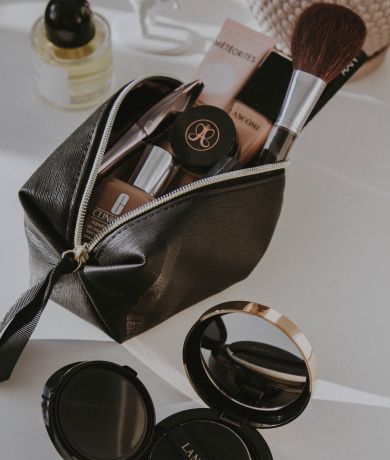Publication date May 5, 2023
Do you know about these 8 proven ways that will help you regulate your periods
There are few topics more sensitive than those surrounding our menstrual cycles. But, at the same time, a few topics demand more attention and understanding. After all, regulating our periods is something that affects us all. From the days of being late in junior high to the age of tracking apps and actively trying to conceive, learning to understand, manage and even tweak our menstrual cycles is a life-long journey. Whether you've just started your period journey or are already dealing with the effects of irregular periods and want to know what you can do to help regulate them better - I've got you covered! In this article, I'll provide you with eight proven ways to help you regulate your periods more effectively. So let's get started!

Source: Pexels
Recommended articles
What Is the Menstrual Cycle?
If you're having trouble regulating your periods, it helps to get a refresher course on the menstrual cycle. Your menstrual cycle is the time between your periods. It's divided into two parts—the follicular and luteal phases.
The follicular phase begins with ovulation, which starts on day 13 or 14 of an average 28-day cycle and occurs when your body releases a mature egg. The egg is transported through the fallopian tube towards the uterus, where it's ready to be fertilized by sperm. It disintegrates if it isn't fertilized, and your body starts shedding old tissue from your uterus through menstruation. This phase usually lasts 14 days and ends with menstruation.
The luteal phase is usually shorter than the follicular phase, lasting about 10 to 16 days until ovulation starts again. During this time, hormones prepare your uterus for pregnancy in case of fertilization—but if that doesn't happen, they drop dramatically after day 28 and trigger menstruation again. The whole process comprises 28 days but can vary from person to person.
Here are eight proven ways to regulate your periods:
Low-Impact Exercise to Regulate Periods
Regular exercise is one of the most impactful steps you can take for your health, including regulating your menstrual cycle. Low-intensity exercises—such as yoga, light walking, or swimming—have been proven to help regulate periods. However, too much strenuous exercise can have the opposite effect and disrupt the hormonal cycles that affect your periods.
Regular exercise will help improve the symptoms of PMS and may even reduce the pain often associated with menstruation. It helps to balance hormones naturally without relying on medications or other treatments. Plus, regular exercise can make periods more regular by helping your body better understand when it needs to start bleeding again.
The key is to keep your workouts moderate but consistent—aim for a minimum of three times per week for about 30 minutes each session. This helps to ensure that your body remains in a natural state of balance and doesn't overstress itself with strenuous activities associated with intense workouts.
Nutrition & Supplements for Period Regulation
Nutrition and supplements play a crucial role in regulating your periods. Particular ingredients are beneficial for women's health, such as B vitamins, omega-3 fatty acids, and minerals like zinc, magnesium, selenium, and copper.
B Vitamins
B vitamins are an essential component for the production of female hormones, so it is essential to incorporate them into your daily diet in order to regulate your periods. Many foods rich in B vitamins are nuts, leafy greens, eggs, beans, peas, and whole grains. A 2011 study found that women who consume food sources of B vitamins have a significantly lower risk for PMS (premenstrual syndrome). Additionally, a daily multivitamin may be necessary to ensure adequate intake of these vitamins.
Omega 3 Fatty Acids
Omega-3 fatty acids are beneficial for hormonal balance as well as reducing inflammation in the body, which can dysregulate the menstrual cycle. Common sources of omega-3 fatty acids are salmon, mackerel, sardines, flaxseeds and walnuts.
Minerals
Minerals such as zinc play a crucial role in hormone regulation and help the body break down estrogen more efficiently. Foods rich in zinc include grass-fed beef and lamb, pumpkin seeds, spinach and quinoa.
Magnesium helps relax muscles which is helpful when dealing with period cramps, while selenium helps regulate metabolism, which also helps with regular periods.
Copper helps reduce uterine contractions that cause period cramps as well as assists in regulating menstrual cycles by balancing hormones. Excellent food sources of copper include dark leafy greens like kale or spinach, along with legumes like lentils or kidney beans.
Making sure you are taking the correct supplements and eating a balanced diet will aid in Period regulation!
Reducing Stress Levels & Getting Enough Rest
When was the last time you took a break and truly unwind? Everyone has different ways of de-stressing and getting enough rest, but it's important to ensure that you make time for both. Do things that make you satisfied and happy, such as taking a nice walk in nature or reading a good book.
Stress levels
We all experience stress in life—it's an unavoidable part of being human. But too much of it can take a toll on your periods. If you're feeling especially stressed, try out some relaxation techniques like deep breathing, yoga or mindfulness meditation. A 2017 study comprising 64 women looked at the effect of practicing yoga over 12 weeks. It found that after 12 weeks of yoga, the participants had improved physical function, less body pain, swelling, breast tenderness, and fewer cramps. If those don't work for you, don't hesitate to talk to someone about the way you're feeling—bouncing ideas off someone else can help put things into perspective and uncover solutions faster!

Source: Pexels
Enough rest
We understand that life can get pretty busy and hectic at times—so carve out some time for yourself now and then to get enough rest. For example, try taking 20 minutes every day for some peace and quiet after your workday has concluded. Additionally, get 7-9 hours of sleep each night if possible; research shows that people who get adequate sleep are more likely to have more balanced hormones throughout their menstrual cycle!
Herbal Remedies for Period Regulation
Did you know that there are herbal remedies that can help regulate your periods?
Yes, it's true! Certain herbs can help with period regulation, and they come with virtually no side effects. It's important to remember, though, that herbs work differently for each person depending on your particular body chemistry and hormones. So it's best to check with a doctor or health specialist before embarking on a herbal remedy for period regulation.
Some of the common herbs used for period regulation include:
- Chamomile Tea: Chamomile and its tea has been used by ancient people for centuries for its calming effects. However, in modern societies, it has been used to help regulate estrogen levels.
- Maca root: Maca root helps balance hormones and may also help relieve PMS symptoms like cramps, fatigue and mood swings.
- Thyme: Thyme is another well-known herb with great health benefits, like reducing inflammation and regulating hormones in the body. It's also known to help balance estrogen levels which can be helpful in regulating your periods.
Ginger: Ginger has anti-inflammatory properties that make it great for the relief of menstrual cramps and discomfort associated with period irregularity.
These are just some of the many herbal remedies available out there that could potentially help you to regulate your periods, but please remember it's always crucial to consult with an experienced healthcare professional before trying any herbal remedies and take into account any allergies you may have due to possible interactions with other medications you may be taking.
Ditch Coffee and Sugar
When it comes to regulating your periods, one way to go is to ditch coffee and sugar as much as possible. Caffeine and sugar can both mess with hormone levels, which can make your menstrual cycle irregular or even increase PMS symptoms.
So why is it important to minimize caffeine and sugar intake?
Caffeine can disrupt hormones
Coffee has been linked with a dip in levels of progesterone and estrogen, two key hormones involved in the menstrual cycle. A study shows that caffeine intake caused a disruption of regular menstrual cycles in women who consumed more than 300 milligrams (mg) per day. That's only about five cups of coffee or tea per day.
Sugar and artificial sweeteners play a role, too
It's not just caffeine that affects hormone levels. Too much sugar consumption also negatively affects hormones like insulin and cortisol. To promote regular periods, you may need to adjust your diet by:
- Limiting caffeine intake to one cup per day or less
- Limiting added sugars like syrups and honey, aim for no more than six teaspoons (25 g) per day.
- Avoiding artificial sweeteners if possible
Acupuncture and Other Natural Therapies
The traditional medicinal practice of acupuncture has been used for centuries to ease physical ailments, and it turns out it can be really useful in regulating your periods too. Acupuncture works by stimulating key anatomical points in the body and is based on the idea that vital energy flows through these points, which eventually regulate specific bodily functions.
Alongside acupuncture, there are a few other natural therapies that might be able to help with regularizing your menstrual cycle. These include:
- Abdominal massage - a type of massage specifically focused on balancing hormones in the area around your abdomen.
- Guided meditation - research suggests that focusing on mindful meditation and exercise can help alleviate menstrual issues like missed or irregular cycles.
- Dietary changes - eating whole foods and following an anti-inflammatory diet may be able to help with period regulation.
Whether it's acupuncture, herbal remedies or dietary changes, talking to your doctor or healthcare provider first is really important when trying out natural therapies, as they will be able to provide personalized advice tailored to your individual health needs.
Check Your Hormone Balance
Hormones play a vital role when it comes to regulating your periods, so checking your hormone balance is an important step. A few hormones that affect your cycle, such as estrogen and progesterone, can fluctuate due to stress, diet and other lifestyle factors.
When your hormones are out of balance, you may experience irregular periods. To make sure your hormones are balanced, consider talking to a healthcare professional about the best ways to regulate them. Depending on the individual, this could be through changes in diet or lifestyle habits or through taking supplements or medications.
It's important that you are aware of the hormones involved in regulating menstruation, so you can look out for signs of imbalance and eventually restore a regular cycle. Here are some signs of hormonal imbalance that can lead to irregular periods:
- Weight gain or loss
- Fatigue
- Acne
- Unusual cravings for unhealthy foods
- Low sex drive
- Anxiety and depression
If you encounter any of the above symptoms on a regular basis, it's best to see a healthcare professional in order to ensure that your hormone levels stay balanced. That way, you can help regulate your periods and improve overall health in the long run.
When to See a Doctor
It's also important to know when to consult a doctor. If you experience periods that last more than 21 days, if there is more than a 35-day gap between periods, or if you have intense pain during your period, it's best to make an appointment with your gynecologist. This is also true if you experience heavy blood flow or bleeding that lasts for more than eight days.
Common Causes of Irregular Periods
Your doctor can help diagnose the specific cause of irregular periods and offer treatments tailored to the underlying issue. Common causes of irregular periods include:
- Polycystic ovarian syndrome (PCOS)
- Thyroid disease
- Stress and anxiety
- Eating disorders, such as anorexia or bulimia
- Uterine fibroids or polyps
- Hormonal imbalance or hormonal contraception
- Endometriosis
It's important for anyone experiencing irregular periods to see a healthcare provider for a better diagnosis and personalized treatment plan.
Conclusion
Proper menstruation is essential for all women, and it's important to understand the key parts of your menstrual cycle. By understanding the natural rhythm of your body and the various factors that can influence it, you can better manage it and ensure regular, healthy periods.




